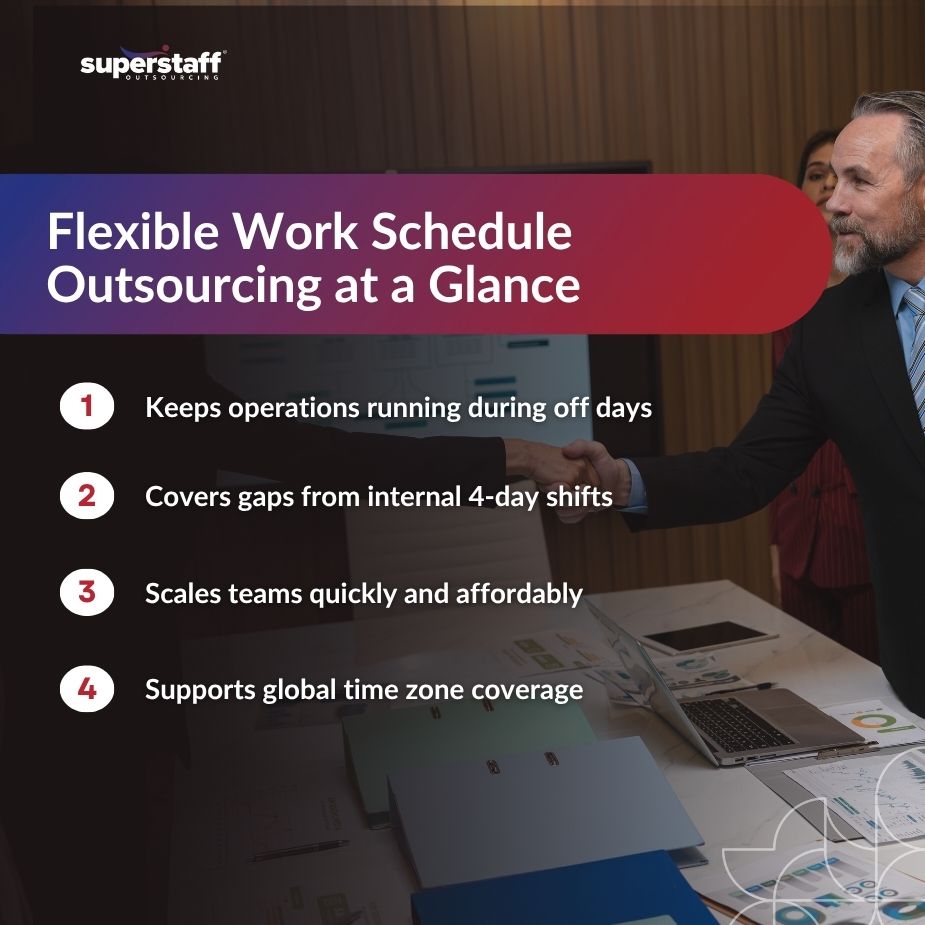
The 4-day workweek is no longer a radical idea—it’s becoming a competitive advantage. From global pilot programs to small business experiments, reduced-hour models are gaining traction as a way to attract top talent, reduce burnout, and retain high performers. But while a shorter week sounds great in theory, it raises an immediate challenge: How do you maintain seamless operations when your internal team is offline 20% more of the time?
That’s where flexible work schedule outsourcing comes in. By strategically partnering with outsourcing providers, companies can explore or implement flex scheduling without compromising productivity or service levels. In this blog, we’ll explore how outsourcing makes it possible to transition to a 4-day workweek by ensuring global coverage, redistributing workload, and keeping business running smoothly even when your team takes a well-deserved day off.
The Global Momentum Behind the 4-Day Workweek
The 4-day workweek isn’t just a headline—it’s a growing global movement. Pilot programs in countries like the UK, Belgium, Iceland, and Japan are producing measurable results: happier employees, higher retention rates, and even increases in productivity. The UK’s 4 Day Week Campaign, for example, saw 92% of participating companies opting to continue the schedule after the trial.
Employees are speaking loudly—and employers are listening. The demand for flexibility has shifted from perk to expectation. Workers want more than time off; they want the freedom to balance work with life. That might mean four 10-hour days, or four standard days with no dip in pay. It might mean asynchronous models where results matter more than hours worked.
But while the benefits are well-documented, implementation is where many companies get stuck. Fewer workdays mean fewer internal hours to address customer issues, manage back-office operations, or handle the unexpected. For many businesses, particularly SMEs and midmarket companies, there’s simply not enough slack in the system to absorb that loss. This is where flexible work schedule outsourcing becomes essential.
Outsourcing Closes the Coverage Gaps
One of the biggest operational challenges of the 4-day workweek is maintaining coverage—especially for customer-facing roles and high-volume support tasks. When your internal team isn’t available, who picks up the slack?
That’s the role outsourcing plays. Strategic partners provide offshore or nearshore teams that fill in those gaps seamlessly. Your customers won’t notice that your core team is offline on Fridays, because an equally capable outsourced team is handling inquiries, troubleshooting issues, and moving tasks forward in the background.
Flexible work schedule outsourcing ensures business continuity by activating support teams in different time zones. Rather than stretch your internal staff or hire expensive temporary talent, you can delegate recurring or time-sensitive tasks to a dedicated external team. They can keep operations running during your team’s off hours, maintaining productivity and preserving your reputation for reliability.
Flexibility at Scale: Why Outsourcing Makes Schedules Work

Making a 4-day workweek sustainable is all about scale and balance. You need the ability to redistribute workloads and absorb volume spikes, especially if your internal teams are working reduced hours. Outsourcing gives you that scalability—and more.
Need to adjust capacity for peak season? Your outsourcing partner can add seats without the long hiring process. Looking to rotate internal teams on different days off? Your external team can offer consistent coverage across all weekdays. Trying to protect internal bandwidth for innovation and leadership? Outsourcing lets you delegate the routine while your in-house experts focus on strategy.
Flexible work schedule outsourcing supports variable staffing models—whether you need part-time agents, weekend coverage, or rotational shifts. This kind of responsiveness is essential in a world where flexibility is a competitive differentiator. And it doesn’t have to stop at customer service. Outsourcing can cover data entry, IT help desk, billing support, and more.
Protecting the Customer Experience
One of the biggest fears companies have when moving to a 4-day schedule is the impact on customer experience. If your clients need help on Friday but your team is offline, service quality can plummet. But that doesn’t have to be the case.
Outsourcing keeps the customer experience seamless. Trained agents uphold service level agreements (SLAs), resolve issues quickly, and ensure that customer satisfaction remains high—regardless of your internal team’s schedule. By covering nights, weekends, or flex days, your outsourcing partner protects response time and issue resolution.
Flexible work schedule outsourcing also brings the benefit of global coverage. Agents across different regions can offer multilingual and omnichannel support, making your brand more accessible and responsive. Customers can get help when they need it, in the language they prefer, without delay. That’s not just a backup plan—it’s a CX upgrade.
Happier Teams, Leaner Operations
There’s another side to the equation: your people. Shorter workweeks reduce burnout and increase engagement, but only if workloads are properly managed. If teams are asked to cram five days of work into four without support, the model collapses.
Outsourcing removes that pressure. BPO partners take over repetitive, manual, or non-core tasks—allowing your team to focus on higher-value work during their limited hours. Whether it’s managing your CRM system, handling Tier 1 support tickets, or managing administrative workflows, outsourcing lets you run lean without letting quality slip.
Flexible work schedule outsourcing also enables more efficient use of your in-house team. You don’t need to overstaff just to maintain full coverage. Instead, you can rely on flexible staffing solutions that scale up and down based on demand. That’s good for budgets and even better for morale.
Culture-First Collaboration
Transitioning to a 4-day workweek isn’t just an operational shift—it’s a cultural one. And successful outsourcing partnerships understand that. The best BPOs act as an extension of your team, aligning not just with tasks and goals, but with values and voice.
That means onboarding outsourced agents the same way you onboard internal hires. It means sharing your tone, your processes, and your expectations. And it means maintaining consistent communication, whether through shared project tools, regular check-ins, or feedback loops that keep everyone aligned.
Flexible work schedule outsourcing works best when your external team isn’t just executing, but engaging—supporting your culture while delivering your outcomes. The right partner will care about your customers and your employees just as much as you do.
SMEs Are Leading the Way
It’s not just large corporations with massive budgets that are experimenting with shorter workweeks. Small and mid-sized businesses are right at the forefront, using outsourcing as a way to stay agile and competitive.
Startups lean on BPOs to keep customer support running while their teams iterate on products. Ecommerce companies use offshore teams to handle order management and returns. Health tech firms outsource compliance-heavy back-office tasks so internal staff can focus on innovation. And SaaS providers delegate Tier 1 support to partners so engineers can focus on development.
The flexibility offered by outsourcing solutions to support employee flexibility makes all the difference for lean teams with big ambitions. It allows them to punch above their weight—delivering reliable service, growing sustainably, and supporting their teams with humane work models.
Why Flexible Work Schedule Outsourcing Works
Flexible work schedule outsourcing empowers companies to embrace shorter weeks and flexible schedules—without falling behind. It removes the friction that often makes 4-day experiments fail: coverage gaps, operational stress, inconsistent customer service, and overworked teams.
With outsourcing in place, companies gain the ability to operate 24/7 even when internal staff are offline. They can scale up fast, reallocate work intelligently, and offer consistent support across regions and time zones. They also benefit from reduced overhead, better retention, and a workplace culture that respects work-life balance.
So whether you’re piloting a new schedule or making flex work your norm, outsourcing makes the path forward smoother.
Ready to give your team the time they deserve—without missing a beat? Partner with SuperStaff to build a flexible, high-performing workforce. Through flexible work schedule outsourcing, we’ll help you implement how outsourcing enables a 4-day workweek for businesses—strategically, sustainably, and with world-class support. Let’s make the 4-day workweek work for you!






